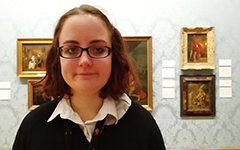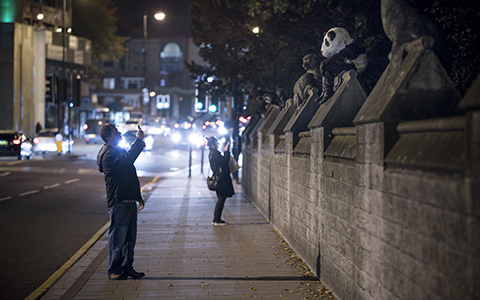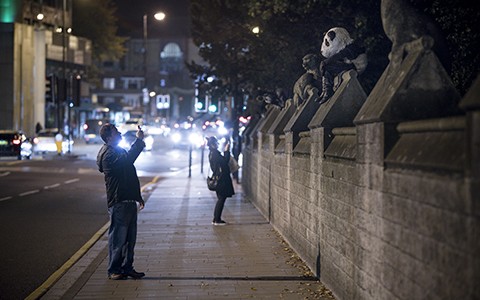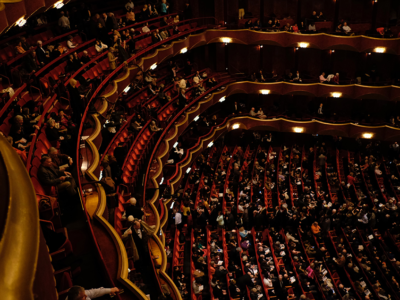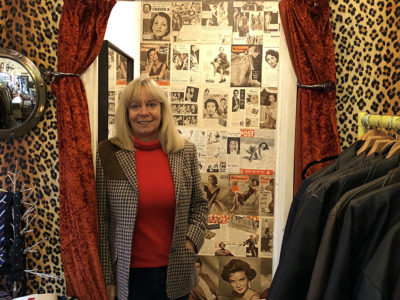What effect will the loss of History of Art as an A-level subject have on art?
 Michael Conbridge, 49, museum assistant
Michael Conbridge, 49, museum assistant
“I studied art history for A-Level and I thought it gave me a background into society and culture that I have found has lasted me for my life.”
“If we are only going to value certain types of qualification then we will lose a lot of knowledge and diversity of people’s skills. a lot of contemporary art that is happening now needs to be contextualized with what came before.”
 Dominic Williams, 24, museum assistant
Dominic Williams, 24, museum assistant
“Coming from a history point of view, it’s quite similar. I think we are losing the ability to look back and learn from our mistakes. I think art is the same, not learning and moving forward and actually pushing art in the modern direction that it should go.”
“I think it’s a matter of the art as a historical subject being different from art the practical subject. To be honest, I don’t see there’s going to be a huge loss in terms of students of art. I don’t see it as being a negative factor at all.”
Cardiff Contemporary visual arts festival runs until 19 November.
The Angel gallery (next to the Angel Hotel, Castle St, Cardiff CF10 1SZ) serves as the hub for the festival’s exhibitions.
Visit their website for further details of exhibitions
Check out their Facebook and Twitter for updates
The Cardiff Contemporary arts festival is currently underway, but the recent dropping of Art History as an A-Level subject casts an uncertain spell over the future of contemporary arts festivals, and art itself.
History of Art is being cut as an A-Level subject from 2018. Considered the preserve of private schools, and referred to as a “soft” subject, some may consider the cut as no real loss to education. To those in the art world, it indicates a worrying trend in attitude to the arts from the UK government.
Maia Conran, who is artist-in-residence at this year’s Cardiff Contemporary festival, says that it is a “sad” situation where the less people who study the subject at A-Level means less people studying it at a higher level.
Contemporary art is often seen as fringe to traditional forms of art. Will less people studying History of Art at A-Level mean that the audience for non-conventional forms of art will dwindle? Perhaps not, as there has been an increase in visitor numbers to museums and galleries this year.
“People should sit up and take notice of this decision and consider the implications and reasons behind it.”
Maia says that public feedback during the festival has been positive. This is a sentiment shared by Ruth Cayford, manager of Cardiff Contemporary, who says that public reaction has been “fantastic” this year. This arts festival is biennual, but Ruth says making it an annual event is dependent on public demand.
Not everyone involved in the arts sees the cut as a loss. Gareth Pahl, a performance artist, suggests that perhaps people’s appreciation of art comes from the practice of it, not necessarily the study of it. Ruth is less optimistic. She feels this decision will stunt intellectual discourse for future generations, stating that “People should sit up and take notice of this decision and consider the implications and reasons behind it.”
Cardiff Contemporary 2016 Launch Week End from Culture Colony on Vimeo.
What effect will the loss of History of Art as an A-level subject have on art?
 Michael Conbridge, 49, museum assistant
Michael Conbridge, 49, museum assistant
“I studied art history for A-Level and I thought it gave me a background into society and culture that I have found has lasted me for my life.”
“If we are only going to value certain types of qualification then we will lose a lot of knowledge and diversity of people’s skills. a lot of contemporary art that is happening now needs to be contextualized with what came before.”
 Dominic Williams, 24, museum assistant
Dominic Williams, 24, museum assistant
“Coming from a history point of view, it’s quite similar. I think we are losing the ability to look back and learn from our mistakes. I think art is the same, not learning and moving forward and actually pushing art in the modern direction that it should go.”
“I think it’s a matter of the art as a historical subject being different from art the practical subject. To be honest, I don’t see there’s going to be a huge loss in terms of students of art. I don’t see it as being a negative factor at all.”
Cardiff Contemporary visual arts festival runs until 19 November.
The Angel gallery (next to the Angel Hotel, Castle St, Cardiff CF10 1SZ) serves as the hub for the festival’s exhibitions.
Visit their website for further details of exhibitions
Check out their Facebook and Twitter for updates

